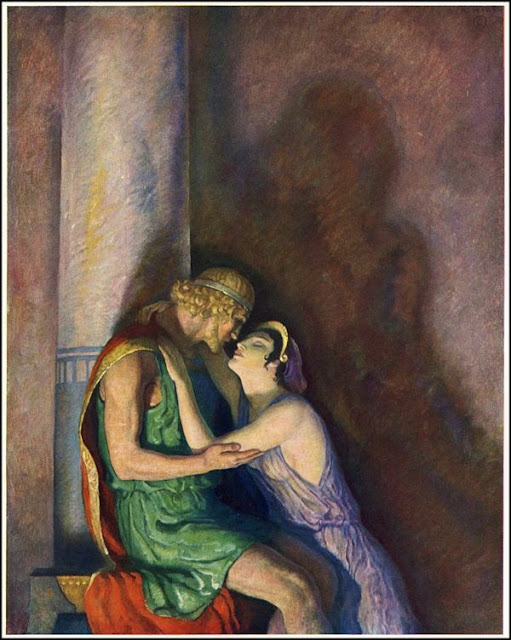Odysseus & Penelope: The Virtue of Faithfulness
One of the books I read over and over again as a child was
The Adventures of Ulysses, by Gerald Gottlieb.
It is a wonderful book in itself; not as deep as the actual Odyssey, but a wonderful dramatization
for children – Odysseus’s dragging struggle to return to his home is portrayed
so well that you yourself are tired out by the end of the book. For myself, the
best part of the story wasn’t the fighting, or the winning, or the interesting
monsters that Odysseus encountered. It was his connection to Ithaca, and
Penelope’s faithfulness in waiting for him.
The story concerns Odysseus’ journey to return home; always
the driving motive for the wave-tossed king is the thought of his land and his
wife and his son waiting for him. Even when Calypso waylays him on her island –
a beautiful, quasi-goddess, desirous to keep him forever in paradise – he longs
to return to his wife. For all his faults, and his underhanded and sometimes dishonest
behavior, Odysseus is a man who recognizes his responsibility. Even on Calypso’s
heaven of an island, with an always-young, ever-beautiful nymph for a lover, he
remembers Penelope waiting for him.
A theme that can be seen in Penelope and Odysseus’
relationship is their like-mindedness. As Odysseus is clever and underhanded,
so is Penelope. As Odysseus longs to return to his wife, so Penelope longs for
her husband’s return. Mirroring Odysseus’
subtility, Penelope handles her suitors with deviance and subtlety. She tells
them that she will choose one of them to marry when she is done weaving her
father-in-law’s burial shroud, but each night she unravels the weaving that she
has done the day before. Being a woman, and not able to take militant action
against the men seeking her hand in marriage without breaking diplomatic rules,
she holds them off almost indefinitely, until a serving woman’s traitorous
behavior reveals her lie.
With that, she does not immediately concede, but sets yet
another test. He who can string her husband’s bow and fire an arrow from it can
gain her hand in marriage. This, along with her apparent grief, is a strong
indicator that her thoughts and desires are strongly directed toward her husband,
and it is no wonder, as he is the only one able to handle his bow. The test of
the bow provides the catalyst for Odysseus triumphant and bloody return, and the
reunion of the couple.
Of course, there are failings in this story: Odysseus trips
many times, even by ancient standards, which would not have counted his relationship
with Calypso as real infidelity (no one turns down a goddess). Penelope, at one
point, considers marrying one of the suitors. But the strength of the couple,
and the ways they mirror each other in subtlety and fidelity, show us the
markers of a real power duo.
When Odysseus reveals himself to Penelope, who has been
waiting ten years, she doesn’t believe it is him, and she uses deception yet
again; telling a servant to move their marriage bed to a different room.
Odysseus, who knows one of the posts of the bed is a living tree, protests that
the bed cannot be moved, and thus Penelope knows he is himself. The faithfulness
of Odysseus to return to his wife and his land and his responsibility is
rewarded with the faithfulness of Penelope in keeping herself true to him, even
under incredibly difficult home invasion circumstances.
Penelope and Odysseus are a couple matched in deceptive capabilities.
They are united in an impressive way through their shared faithfulness to each
other. We understand the reason that Penelope waited for Odysseus’ return, and
we understand the reason that Odysseus worked so hard and so long to return to
Penelope.
Penelope and Ithaca could not be separated in Odysseus mind.
The wife and the land and the legacy were one and the same; something worth
sacrifice and pain and rejection and even the possibility of death.
Let us make Odysseus and Penelope’s legend a greater part of
our culture than Romeo and Juliet. It is a deeper story, with a better moral.






Comments
Post a Comment